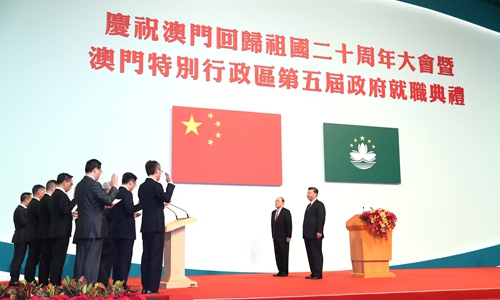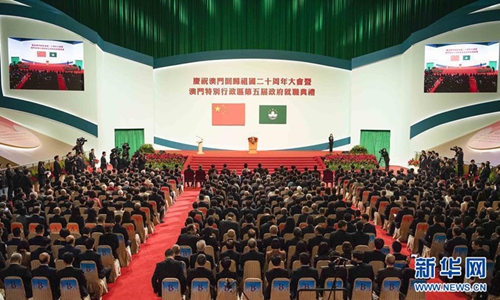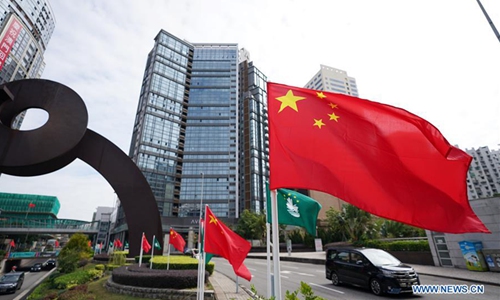
Chinese President Xi Jinping (right) oversees the swearing-in ceremony of Macao SAR Chief Executive Ho Iat Seng (second from right), the principal officials of the Macao SAR government and members of the Macao SAR Executive Council. Photo: Xinhua
After Hong Kong and Macao returned to China, handling the affairs of these two special administrative regions (SAR) was absolutely China's internal affairs, and external forces should not point the finger at them, Chinese President Xi Jinping said on Friday at the ceremony celebrating the 20th anniversary of Macao's return to China and the inauguration of the fifth-term government of the Macao SAR.
China won't tolerate any external interference in Hong Kong and Macao affairs, Xi said.
Xi's speech sends a clear message to the world that the confidence in implementing the "one country, two systems" principle won't be shaken. Considering Hong Kong's turmoil in recent months, Macao's practice of the principle tells the world that China's SARs could successfully implement it, analysts said.
Xi said on Friday that the Chinese government and the Chinese people's will to safeguard national sovereignty, security and development interests are rock solid.
His statement led to warm applause.
Xi commended the work of the Macao SAR in the past 20 years. Macao firmly safeguarded the central government's comprehensive administration and used its high degree of autonomy in the right manner, enacting Article 23 of the Basic Law and the National Anthem Law, Xi said.
President Xi on Friday also inspected the Chinese People's Liberation Army (PLA) Garrison in Macao. He reviewed the honor guards and combat, counter-terrorism and emergency aid troops, China Central Television reported.
Xi called on the garrison to improve their capability in fulfilling their responsibilities and make more contributions to the successful implementation of "one country, two systems" in Macao.

A gathering in celebration of the 20th anniversary of Macao's return to the motherland is held in south China's Macao, Dec. 20, 2019. (Xinhua/Li Tao)
Reminder for Hong Kong
During his three-day visit to Macao, Xi highly praised the city's experiences in implementing "one country, two systems," which, observers and local officials said, offer valuable experiences to Hong Kong to tackle deep-rooted social issues.
During his speech at the ceremony on Friday, Xi shared Macao SAR's four experiences in successfully implementing "one country, two systems." They are the firm dedication to "one country, two systems" and confidence in the political system, recognizing that "one country" is fundamental to "two systems," highlighting responsibilities that the Macao SAR should shoulder in line with the national development plan, and strengthening social fundamentals of "one country, two systems." Patriotism is the most important reason for Macao's successful implementation of "one country, two systems," Xi said.
Successful experiences in implementing "one country, two systems" in Macao serve as a "reminder" to Hong Kong, indicating loopholes exist in Hong Kong's legal and judiciary systems that lead to weakening the way national security and sovereignty are safeguarded, observers said.
The "one country, two systems" principle, proposed in the 1980s, is feasible, workable and popular with the people, Xi said.
"Of course, the principle needs consistent perfection through practice," he said, noting that the undertaking of "one country, two systems" will be perfected and the special administrative regions will be governed in an even better fashion, Xi said.
Analysts said Xi's remarks on Friday once again interpreted the "one country, two system" principle and the words were inspirational and important at a time when the months-long turmoil in Hong Kong have shaken some people's confidence in the principle.
"Xi's speech shows that the central government is confident in tackling the challenge with the HKSAR government together. If Hong Kong can make it through, it would eventually prove the vitality of the principle," Tian Feilong, associate professor at Beihang University in Beijing and member of Beijing-based Chinese Association of Hong Kong and Macao Studies, told the Global Times on Friday.

China's national flags and flags of the Macao Special Administrative Region are seen near the Oriental Arch monument in Macao, south China, Dec. 17, 2019. Over the past two decades, the special administrative region has made great strides in economic development and achieved prosperity and stability under the "one country, two systems" principle. (Xinhua/Wang Shen)
Vital and creative principle
"Summing up Macao's experiences in practicing the principle aims to prove that it is vital and creative. While external forces severely interfered in Hong Kong society, the practice of the principle has also been seriously challenged there," Tian said.
The return of Hong Kong and Macao to the motherland is an important step in realizing the great rejuvenation of the Chinese nation. China has natural and legitimate reasons to oppose any form of external interference, Tian noted.
For Hong Kong and Macao, the implementation of "one country, two systems" must safeguard China's sovereignty and security interests, as the two SARs serve as a bridge to connect and communicate with the world, and external political forces will surely try to make the most of it, observers said.
The Hong Kong government failed to maintain high vigilance in governance, which was taken advantage of by foreign forces who colluded with Hong Kong's secessionists, Li Xiaobing, an expert on Hong Kong, Macao and Taiwan affairs at Nankai University, told the Global Times.
The latest Hong Kong-related act signed by the US is deemed as a blatant interference in China's Hong Kong affairs, which has been strongly condemned by China.
Xi reiterated the Chinese government's firm stance to safeguard China's sovereignty and security interests, which is also seen as the basic governance direction for Hong Kong and Macao SARs, observers said.
Macao's experience in legislation on maintaining national security - including Article 23 of the Basic Law - shows the weakness in Hong Kong, and enacting Article 23 is also the responsibility of the Hong Kong government. This is the basic goal for the SAR and basic task and responsibility for governance of both SAR governments, Li said.
Before his speech, Xi oversaw the swearing-in ceremony of the fifth-term chief executive of Macao SAR, the principal officials of the fifth-term Macao SAR government and members of the Macao SAR Executive Council.
Xi also proposed four expectations for Macao, which are to continue reforms and make administration more effective; push forward sustainable economic development to increase competitiveness; further improve livelihood and actively respond to people's demands in improving healthcare, housing and education; and make "love the country, love Macao" the continuing core values and enhance social consensus.



